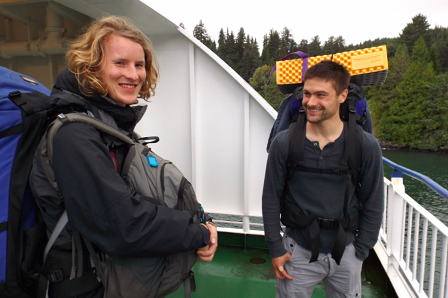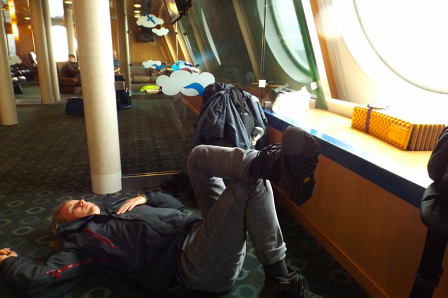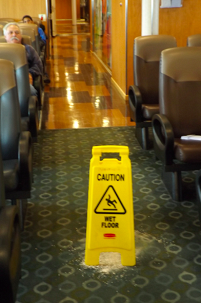Erstellt am: 21. 2. 2014 - 09:00 Uhr
Stormy Weather on the Hecate Strait
FM4 Reality Check: My journey through the Hecate Strait is available to stream as podcast, and in today's Reality Check (12-14).
The first question I should probably answer is, where is the Hecate Strait and why did I go there? Well, it is a waterway in Northern British Columbia, just south of the Dixon Entrance that leads to Alaska. Here it is on a map.
One late summer day last year, I took a ferry from Prince Rupert, which is a small city on the mainland, to Skidegate, a village on the island archipelago of Haida Gwaii (more on that later).
* - Documented here: Johnny's Journeys on the Inside Passage.
You should totally read it.
This was one day after my Inside Passage journey*, which was also one hell of an adventure. Actually, my saying 'one day after' is disingenous, because it was only twelve hours later. (We'd gotten in to Prince Rupert around ten o'clock at night, and left again around ten in the morning.)
Where the Inside Passage was remarkable for being a narrow corridor surrounded by small islands and thick, mysterious undergrowth, the Hecate Strait was remarkable because the passageway was both wide, and shallow. As we would soon learn, this would make it particularly susceptible to strong waves and stormy weather.
Who are we? We are the same characters from my Inside Passage story!
We included Kevin, an engineer from southern British Columbia; Justin, a recent high school graduate from Victoria in Australia; and, well, me.

Johnny Bliss, 2013
* - The duration of the trip was actually less than half that of the Inside Passage; but that's still seven hours on a boat, compared to sixteen the previous day.
Our ferry ride on the Hecate Strait initially was quite similar to what we'd experienced the day before on the Inside Passage; the landscape around us was identical, the ferry looked almost exactly the same, and it was a long-haul trip that would take us most of the day*.
Special thanks go to Eric Kalnins and the other lovely people at BC Ferries without whose assistance, this feature would not exist.
Seven hours is a long time. However, it went by a lot faster than the previous day. I chalk this up to the storm, the whales, and some pretty interesting passengers, right there on the boat with us.
Kevin: [Right at the beginning,] we met up with a local from Haida Gwaii. As he stated to us, one of his given names was Captain. (laughs) He'd just gotten off the crabbing boat. He noted that the wind was picking up as we left the inlet, and that's when the waves and the wind started.
Captain, as I recall, was full of fascinating stories about wandering around with his friends as a teenager on Haida Gwaii, and getting into trouble, in places like caves and abandoned mines.
The anecdote that stuck out in my mind was when he wandered into a cave submerged in water, and went in deep enough that the light from outside was cut off, and it became nearly pitch black. So he pulled out his cell phone, and began to use it as a light... at which point, he saw the eyes of dozens of sea otters, all sitting around in the cave, staring at him.
As I recall, in the story, he beat a fast retreat.
I'd wanted, badly, to interview him. Unfortunately, I did not take heed of his warnings about the stormy waters we were quickly approaching, and soon I was in no mood to interview anyone about anything.
Oh yes. The whales. In my Inside Passage story, I'd promised you that the next chapter would include some decent photographs of whales.
The great sighting we got was of several Humpback Whales, and this just in the first hour or two of the journey, before the waters got too rough: I had just stepped outside for a breath of fresh air, and noticed a group of fellow passengers pointing and shouting, and waving binoculars around.
Naturally, I'd already had the lens cap off of my camera by the time I reached the outer railings, and managed some pretty decent shots of those whales before I'd even properly seen them.
Pure beginner's luck. I had no idea how to use that camera.
It was good that I used it when I did, however, because soon I had little interest in taking photographs.
Adventure Time
We'd put all of our bags at the very front of the boat, right beside the so-called "Kid's Area". This was presumably because we wanted to be the first on the boat to see everything, with the added side effect that the undulation of the boat was strongest where we were sitting/lying/standing.
There was a television playing children's cartoons. At the beginning of the storm, there were several children and parents watching. As the waters got rockier, most of the rest of the audience disappeared.
Justin: As we got onto the open waters, it really started roughening up. The less sailed of us got a little bit, not seasick, but ... felt a little uneasy.
Me: I'd made the mistake of eating a sandwich, right before this really started, which resulted in an unpleasant storm experience. For the first hour or so, I had to keep my eyes closed, and imagine myself swimming, just to cut back on my feelings of seasickness.
Kevin: Actually, to your point about visualization, to help with the queasiness from the massive amounts of undulation we were going through, my method was [that] I grabbed an old book I was reading. When I opened old books as a kid, it was a safe spot for me. So just being able to smell the old book, and rekindle those memories of security, and of calm, was a great way of bringing my body into equillibrium with the sea.
Justin: I [made] the same mistake as Johnny. I had a bit of a snack before, and, yeah... that didn't go down so well! I tended to cope, lying flat on my back method. Maybe it was a bit calmer on the bottom as opposed to being up on a chair. Also, watching the children's TV shows in the Kid Zone was reassuring, and took the mind off what was happening a little bit.

Johnny Bliss, 2013
Me: People were also getting sick, around the boat. Crab-walking to the bathroom, I just noticed that there was barf all over certain seats...
Kevin: There was enough, that whoever was cleaning it up gave up halfway through. [I remember], it was right down the aisle seat, and along the floor, before it got cleaned up with sawdust or kitty litter, whatever they used to sop up sea spill... (laughs)
Me: You couldn't just walk, you had to dance around...

Johnny Bliss, 2013
Kevin: Keep my feet planted, whenever they'd touch the ground! (laughs) There's no method to that sort of madness. It was dash for the nearest seat, and then dash for... well, the ground, I guess. (laughs)
Justin: I went the speed method, trying to gain as much ground as possible between each wave, stabilizing and then going for the next little dash, and also trying to dodge patches of barf.
Kevin: Once it got a little bit more energetic, we [stood] up and [saw] the spray hitting the front window; the front window was actually set back probably forty feet from the bow, so to have these waves spraying over the hull, and completely covering the front windows with white foam... (laughs)
Me: Sometimes you wouldn't see the horizon at all, because the waves were so high. Moments of intense rain and then it would stop.
Kevin: Especially when the ferry was turning its bow to and fro in the waves, just getting pushed around, almost helpless, with that kind of power behind the waves.
Me: We were constantly being turned around by the waves.
Kevin: It looked like there were probably a lot of course corrections, and probably had to be, [because] the waves seemed to change directions every couple minutes. I remember my face hurting because I was smiling through the whole thing. It seemed that I was smiling in the face of fear. (laughs) All my face muscles were hurting, because I enjoyed it so much.
Justin: It made for an enjoyable ferry ride, in the sense of adventure, as opposed to the scenery...
* - I'm not 100% sure I am spelling his name right, however. French and I have an uneasy marriage.
Actually, French and I are not married at all.
I'm terrible at analogies.
On the return trip, I asked the Captain of one such BC Ferries ship, a French-Canadian guy by the name of Orville Bouchart*, to tell me a little bit about the Hecate Strait, and if seafarers would have good reason to fear getting caught up in a bad storm.
The Captain: First of all, it's fairly wide, but the main reason is because it's not very deep, so waves will tend to increase in height when you get to shallow water. That's just a natural reaction of the waves. When it gets too bad, [...] usually we don't go out. Or if we do sail, we will probably shelter behind an island, until the seas calm down a little bit.

Johnny Bliss, 2013
The Captain: The ship does have a modern stabilizing system, which consists of two stabilizing fins that stand on each side of the vessel.
What's it like being captain on a ship where the weather is rough?
The Captain: You always think that you've got the responsibility of not just the ship, but the passengers on board, the crew, which is why we tend to not go out, if it's too rough. It's a decision that's made each time.
And how do you deal with the topic of sea sickness?
The Captain: I've been fortunate enough to never have been seasick. I'm not saying that I feel comfortable all the time, but usually I can tolerate the sea motion.
It must be hard looking out the windows as well, no?
The Captain: Actually, it's easier to look outside the window. Your eyes will adjust to the movement better. The best position in rough seas so that you're not sick, is the bridge, because you can really see what's going on more, and you can really see the wave height.
Does the responsibility of your job get to you sometimes?
The Captain: [No.] It's all a question of trusting the equipment, trusting yourself, trusting your crew, and feeling good about the decisions you've made. You don't want to under-estimate the ocean, it is very big. Even a big ship like this one gets tossed around quite a bit in the ocean.
Here's some actual footage of the storm.
Journey's End / Journey's Beginning
Eventually, all good things must come to an end. The waters calmed down enough that it became possible to sit and stand comfortably. The first land in hours came into view on the horizon; for the first time since the storm began, I remembered that this was just one chapter in our journey.
Justin: It was still quite foggy, and there was lots of fog on the mainland. I didn't actually go up on deck to check it out, I stayed down below with the rocking waves. But it was so special to see a bit of land poking out, and know that our destination was in sight, and we were fast approaching the adventures that awaited us.
Kevin: Aside from the islands that we started going through, which were beautiful, just dotting the horizon at first, I was surprised that we were going to be ahead of schedule (or on-time, at least!). And then seeing Skidegate just along the shoreline to the north, really kinda brought home that I was here at the beginning of yet another adventure.
---
Today (Friday, 02/21): FM4 Reality Check: My journey through the Hecate Strait is available to stream as podcast, and in today's Reality Check.
Tomorrow (Saturday, 02/22): FM4 Reality Check Saturday Special: I spoke with a Haida oral storyteller from the Raven Clan, in the village of Old Masset, at the northern end of the island archipelago of Haida Gwaii.


